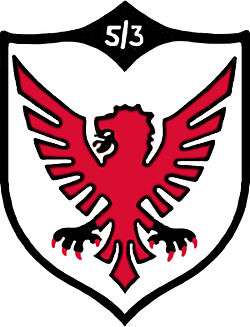513th Fighter-Interceptor Squadron
| 513th Fighter-Interceptor Squadron | |
|---|---|
|
Emblem of the 513th Fighter-Interceptor Squadron | |
| Active | 1943-1961 |
| Country | United States |
| Branch | United States Air Force |
| Type | Fighter |
| Engagements | World War II |


The 513th Fighter-Interceptor Squadron is an inactive United States Air Force unit. Its last assignment was with the 86th Air Division, based at Phalsbourg-Bourscheid Air Base, France. It was inactivated on 8 January 1961.
History
World War II
Established as a dive-bomber attack squadron at Key Field, Mississippi on 1 March 1943, Trained with numerous attack aircraft both at Key Field and at Congree Army Airfield, South Carolina until May 1944. Converted to a Fighter-Bomber squadron and deployed to the European Theater of Operations (ETO) in March 1944. Assigned to IX Fighter Command.
Entered combat with P-47 Thunderbolts in May when the Allies were preparing for the invasion of the Continent. Provided area cover during the landings in Jun, and afterward flew armed-reconnaissance and dive-bombing missions against the enemy, attacking such targets as motor transports, gun emplacements, ammunition dumps, rail lines, marshalling yards, and bridges during the campaign in Normandy. Helped prepare the way for the Allied breakthrough at St Lo on 25 July
Moved to the Continent early in August 1944 and continued to provide tactical air support for ground forces. Aided the Allied drive across France, operated closely with ground forces and flew interdiction missions during the drive to the Moselle-Saar region.
Shifted operations from the Saar basin to the Ardennes and assisted the beleaguered garrison at Bastogne after the Germans had launched the counteroffensive that precipitated the Battle of the Bulge. Operated almost exclusively within a ten-mile radius of Bastogne from 23–27 December 1944, attacking tanks, vehicles, defended buildings, and gun positions. Flew escort, interdiction, and close-support missions in the Ruhr Valley early in 1945 and thus assisted Allied ground forces in their drive to and across the Rhine.
Remained in Europe after V-E Day, being assigned to United States Air Forces in Europe for duty in Bremen, Germany (AAF Station Nordholz) with the army of occupation. Inactivated on 20 August 1946, personnel and equipment being assigned to 86th Fighter Group keeping with Air Force policy of having low-numbered units active as much as possible.
Cold War
Reactivated in England as an air defense interceptor squadron in July 1952 and assigned to the United States Air Forces in Europe Third Air Force, initially equipped with F-84G Thunderjets. Tasked with both fighter-bomber and air defense roles in the United Kingdom. In the fall of 1953, the squadron was re-equipped with F-86F Sabres which were returned from action in Korea. In 1956, the unit was upgraded to the F-86D Sabre interceptor version and the squadron's mission was changed to assist RAF Fighter Command with air defense of the United Kingdom.
Host 406th FIW was inactivated in March 1958. Reassigned to the 86th Fighter-Bomber Wing at Ramstein AB, West Germany, however stationed at Phalsbourg-Bourscheid AB, France, in a detached status. Operated from Phalsbourg until January 1961 when the F-86s were withdrawn from Europe.
Lineage
- Constituted 629th Bombardment Squadron (Dive) on 4 February 1943
- Activated on 1 March 1943
- Redesignated: 513th Fighter-Bomber Squadron on 10 August 1943
- Redesignated: 513th Fighter Squadron on 30 May 1944
- Inactivated on 20 August 1946.
- Redesignated 513th Fighter-Bomber Squadron on 25 June 1952
- Activated on 10 July 1952.
- Redesignated 513th Fighter-Interceptor Squadron on 1 April 1954
- Discontinued, and inactivated on 8 January 1961.
Assignments
- 406th Bombardment (later Fighter-Bomber; Fighter) Group, 1 March 1943 – 20 August 1946
- 406th Fighter-Bomber (later Fighter-Interceptor) Group, 10 July 1952
- 406th Fighter-Interceptor Wing, 1 May 1955
- 86th Fighter-Interceptor Wing, 25 April 1958
- 86th Air Division, 18 November 1960 – 8 January 1961.
Stations
|
|
Aircraft
- A-20, A-24, A-25, A-26, A-35, A-36, UC-78, BC-1, P-39, and P-40, 1943
- P-47 Thunderbolt, 1943–1946
- F-84 Thunderjet, 1952–1953
- F-86 Sabre, 1953-1960.
References
![]() This article incorporates public domain material from websites or documents of the Air Force Historical Research Agency.
This article incorporates public domain material from websites or documents of the Air Force Historical Research Agency.
- Maurer, Maurer, ed. (1982) [1969]. Combat Squadrons of the Air Force, World War II (PDF) (reprint ed.). Washington, DC: Office of Air Force History. ISBN 0-405-12194-6. LCCN 70605402. OCLC 72556.

.svg.png)